Steps for writing a Twitter summary conference blog post
I recently wrote several blog posts with many tweets1 as a way of taking notes during the American Society of Human Genetics 2018 conference. A few friends asked me how I did this so fast. The process can be summarized into the following main steps.
- Save links of tweets you want to highlight in your post.
- Use a
hugo-powered blog to obtain the code for embedding tweets easily2. - Proofread, edit and post.
My steps detailed
Here’s the actual process I used.
-
Identify the conference Twitter hashtag. In my recent case, that was ASHG18.
-
Create a Google doc or some other simple text file you can access easily from your phone and laptop.
-
While in a presentation, check the latest tweets for the given hashtag. ASGH18 example.

- Copy the link of any tweet you find interesting. If there are none for the session you are in, consider writing some tweets yourself with the conference hashtag!
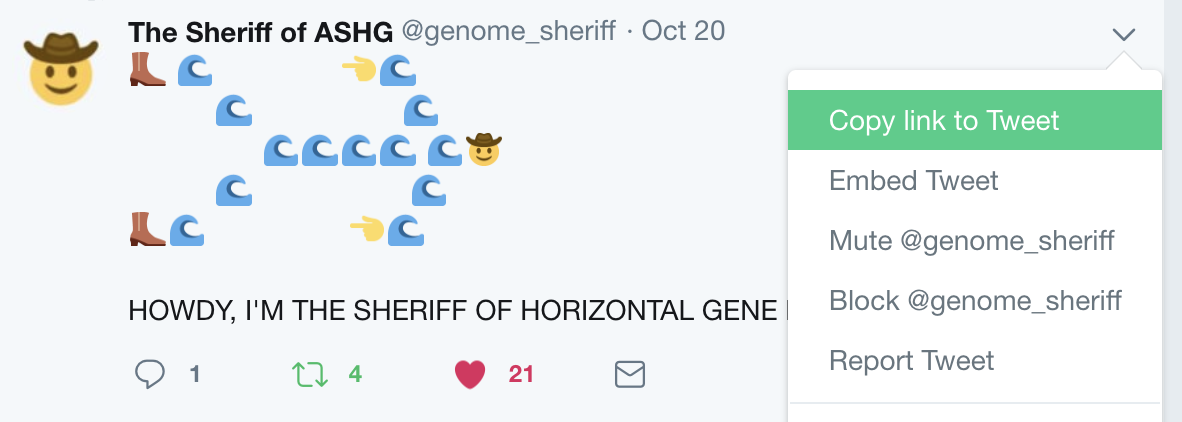
- Paste the link into your Google doc.
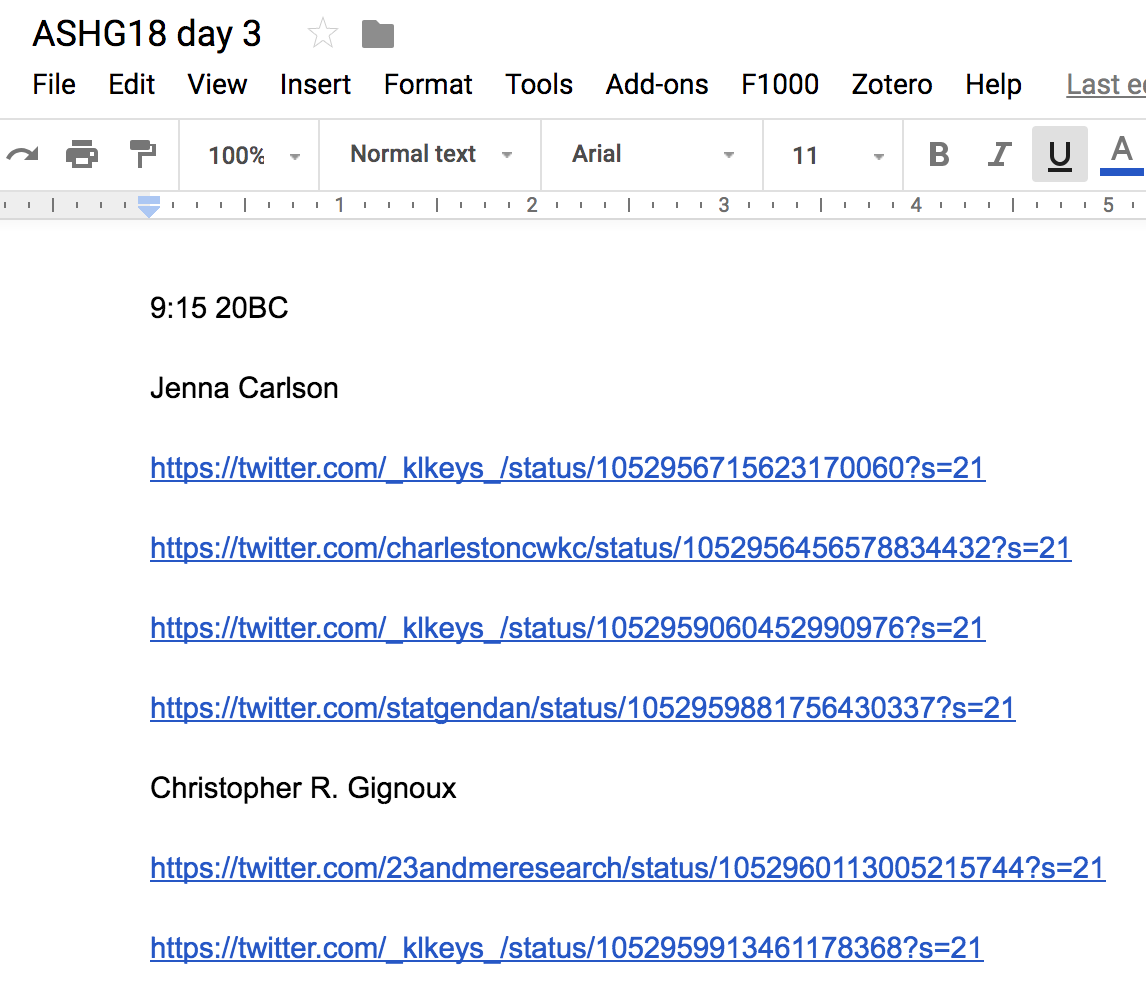
- Once the day is over, copy-paste the contents of your Google doc into a text editor that has the ability to find and replace using regular expressions. For example, TextMate.
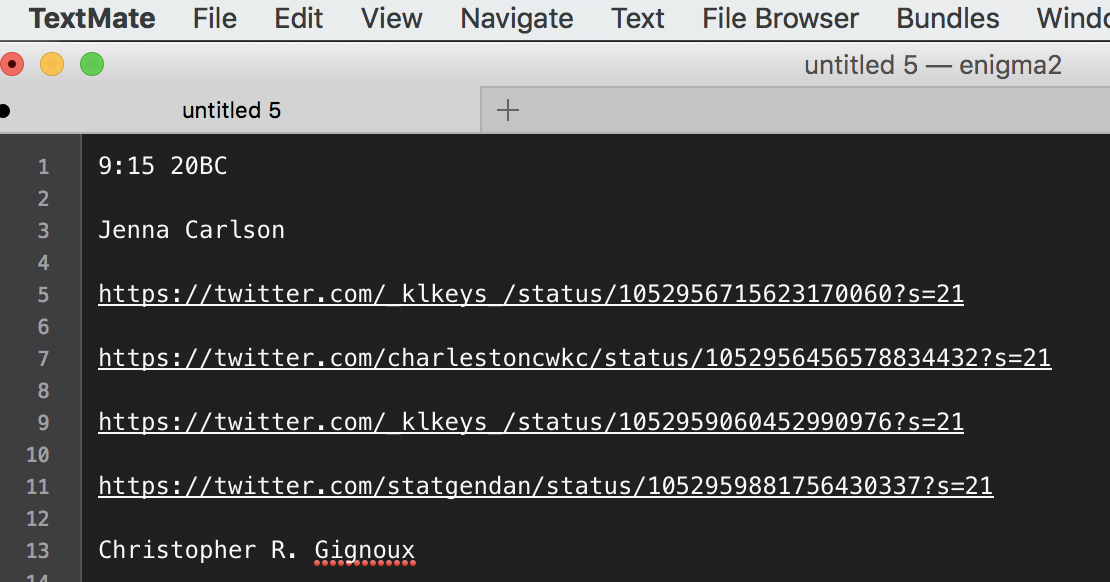
- Find and replace to create the syntax for embedding tweets. I’ll cover more of this in detail in the next section.
Find:
https://twitter.com/.*/status/
and replace by:
\n`r blogdown::shortcode("tweet", "
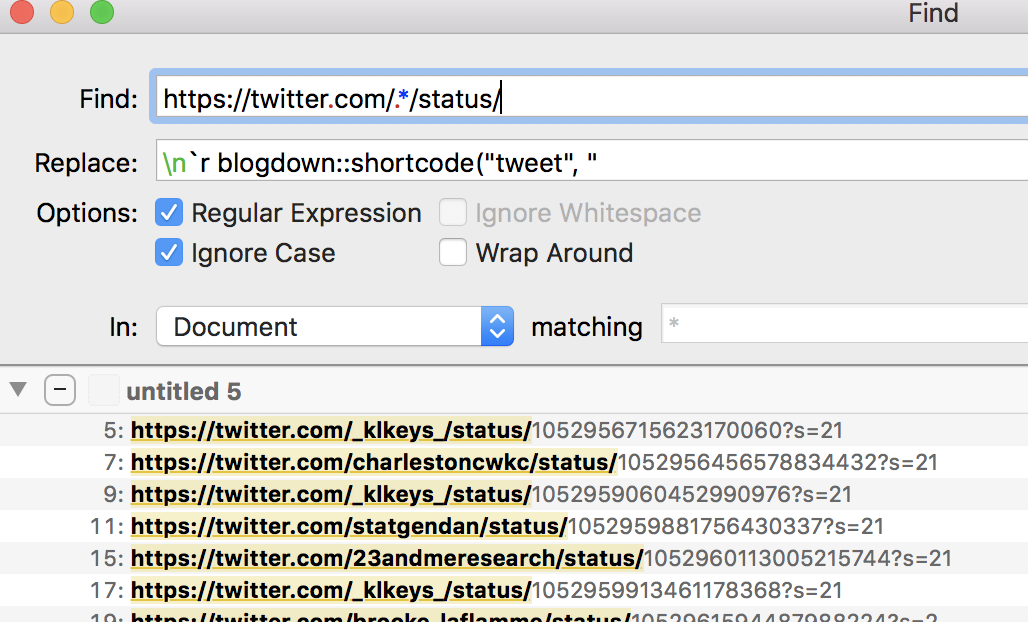
Then find:
\?s=[0-9]*
and replace by:
")`\n
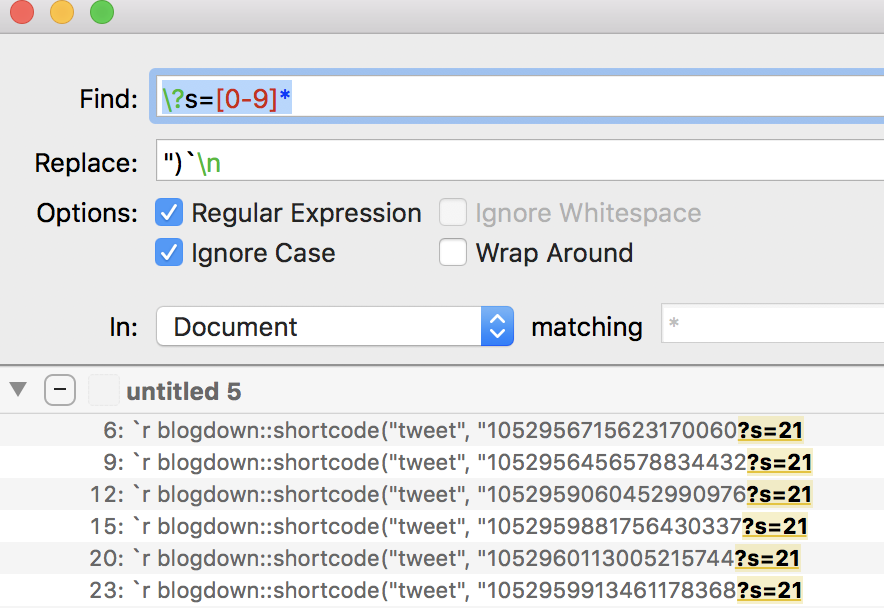
Our file now looks like this:
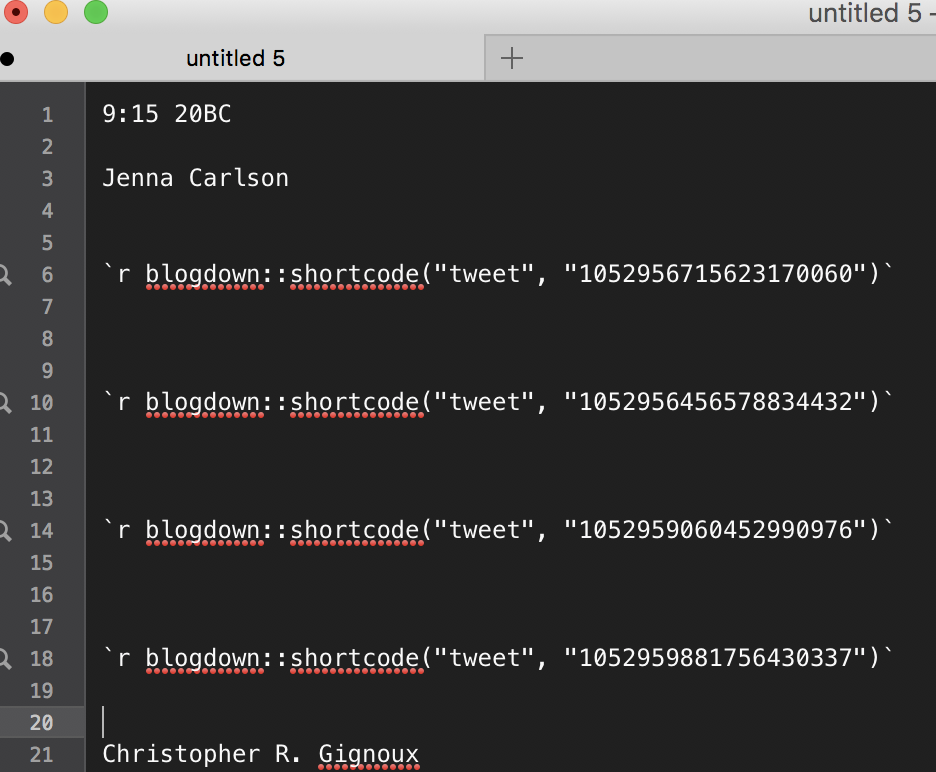
-
Add any comments you wish, format the headings and proofread.
-
Make it public and tweet about your post with the conference hashtag!
And you are done! 🙌🏽🎉
Quick embedding
Note that my blog is powered by blogdown (Xie, Hill, and Thomas, 2017) which has the function blogdown::shortcode() for embedding tweets. For example, blogdown::shortcode("tweet", user="lcolladotor", id="1054380320533950464") generates the hugo syntax code which then hugo renders into the tweet itself.
I just completed my #ASHG18 survey @GeneticsSociety. Took a few minutes and most of my feedback wouldn't stand out. Except that I did use a box to suggest having a webinar with role playing scenarios that exemplify how the code of conduct can be used to diffuse harassment @jsdron pic.twitter.com/AKZdnGCr25
— 🇲🇽 Leonardo Collado-Torres (@lcolladotor) October 22, 2018
As an alternative, we can use Twitter itself by copy-pasting the code for embedding the tweet directly from the Twitter app/website. On the top right side menu on the tweet itself, select Embed Tweet
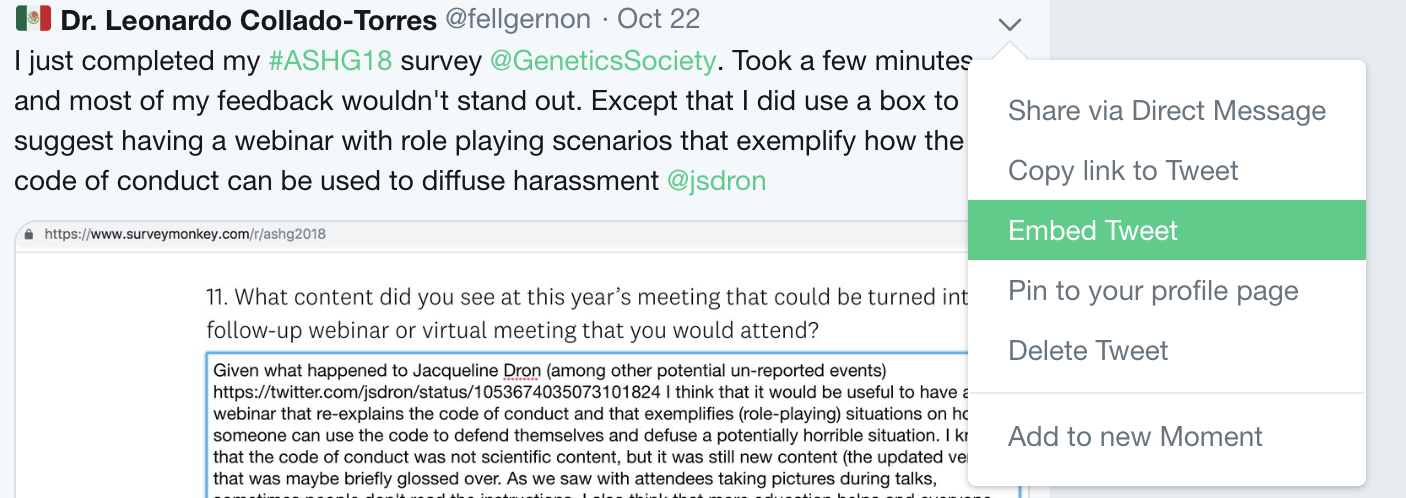
then copy-paste the HTML code into your post.
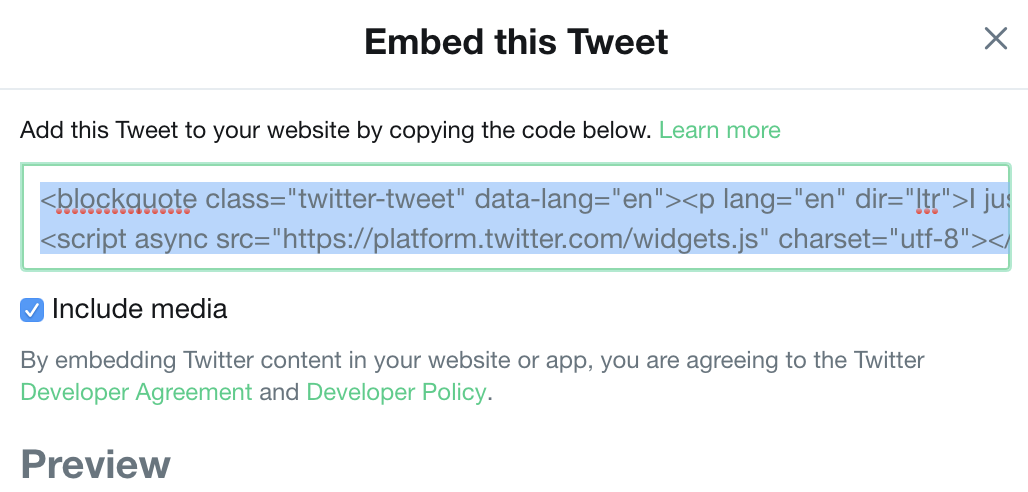
Here’s the code:
<blockquote class="twitter-tweet" data-lang="en"><p lang="en" dir="ltr">I just completed my <a href="https://twitter.com/hashtag/ASHG18?src=hash&ref_src=twsrc%5Etfw">#ASHG18</a> survey <a href="https://twitter.com/GeneticsSociety?ref_src=twsrc%5Etfw">@GeneticsSociety</a>. Took a few minutes and most of my feedback wouldn't stand out. Except that I did use a box to suggest having a webinar with role playing scenarios that exemplify how the code of conduct can be used to diffuse harassment <a href="https://twitter.com/jsdron?ref_src=twsrc%5Etfw">@jsdron</a> <a href="https://t.co/AKZdnGCr25">pic.twitter.com/AKZdnGCr25</a></p>— 🇲🇽 Dr. Leonardo Collado-Torres (@fellgernon) <a href="https://twitter.com/lcolladotor/status/1054380320533950464?ref_src=twsrc%5Etfw">October 22, 2018</a></blockquote>
<script async src="https://platform.twitter.com/widgets.js" charset="utf-8"></script>
and here is how it looks:
I just completed my \#ASHG18 survey (**GeneticsSociety?**). Took a few minutes and most of my feedback wouldn't stand out. Except that I did use a box to suggest having a webinar with role playing scenarios that exemplify how the code of conduct can be used to diffuse harassment (**jsdron?**) pic.twitter.com/AKZdnGCr25
— 🇲🇽 Dr. Leonardo Collado-Torres ((**fellgernon?**)) October 22, 2018
There might be other ways of doing this that are specific to your blog platform.
I also imagine that it should be possible to bookmark the tweets on Twitter and then use an R package to extract your bookmarked tweets from the past 24 hours in order to simplify the process. Maybe this can be done with rtweet although I haven’t dived into it.
New to blogdown?
Check:
- Emily Zabor’s website tutorial
- The blogdown (Xie, Hill, and Thomas, 2017) book.
- Alison Presmanes Hill’s blogdown introduction.
Also, ask around. You might belong to a group or know someone that is willing to host a guest post in their blogdown blog. For example:
Acknowledgments
This blog post was made possible thanks to:
- BiocStyle (Oleś, 2023)
- blogdown (Xie, Hill, and Thomas, 2017)
- knitcitations (Boettiger, 2021)
- sessioninfo (Wickham, Chang, Flight, Müller et al., 2021)
References
\[1\] C. Boettiger. knitcitations: Citations for ‘Knitr’ Markdown Files. R package version 1.0.12. 2021. URL: https://CRAN.R-project.org/package=knitcitations.
\[2\] A. Oleś. BiocStyle: Standard styles for vignettes and other Bioconductor documents. R package version 2.28.0. 2023. DOI: 10.18129/B9.bioc.BiocStyle. URL: https://bioconductor.org/packages/BiocStyle.
\[3\] H. Wickham, W. Chang, R. Flight, K. Müller, et al. sessioninfo: R Session Information. R package version 1.2.2. 2021. URL: https://CRAN.R-project.org/package=sessioninfo.
\[4\] Y. Xie, A. P. Hill, and A. Thomas. blogdown: Creating Websites with R Markdown. Boca Raton, Florida: Chapman and Hall/CRC, 2017. ISBN: 978-0815363729. URL: https://bookdown.org/yihui/blogdown/.
Reproducibility
## ─ Session info ───────────────────────────────────────────────────────────────────────────────────────────────────────
## setting value
## version R version 4.3.1 (2023-06-16)
## os macOS Ventura 13.4
## system aarch64, darwin20
## ui X11
## language (EN)
## collate en_US.UTF-8
## ctype en_US.UTF-8
## tz America/New_York
## date 2023-07-11
## pandoc 3.1.5 @ /opt/homebrew/bin/ (via rmarkdown)
##
## ─ Packages ───────────────────────────────────────────────────────────────────────────────────────────────────────────
## package * version date (UTC) lib source
## backports 1.4.1 2021-12-13 [1] CRAN (R 4.3.0)
## bibtex 0.5.1 2023-01-26 [1] CRAN (R 4.3.0)
## BiocManager 1.30.21 2023-06-10 [1] CRAN (R 4.3.0)
## BiocStyle * 2.28.0 2023-04-25 [1] Bioconductor
## blogdown 1.18 2023-06-19 [1] CRAN (R 4.3.0)
## bookdown 0.34 2023-05-09 [1] CRAN (R 4.3.0)
## bslib 0.5.0 2023-06-09 [1] CRAN (R 4.3.0)
## cachem 1.0.8 2023-05-01 [1] CRAN (R 4.3.0)
## cli 3.6.1 2023-03-23 [1] CRAN (R 4.3.0)
## colorout 1.2-2 2023-05-06 [1] Github (jalvesaq/colorout@79931fd)
## digest 0.6.31 2022-12-11 [1] CRAN (R 4.3.0)
## evaluate 0.21 2023-05-05 [1] CRAN (R 4.3.0)
## fastmap 1.1.1 2023-02-24 [1] CRAN (R 4.3.0)
## generics 0.1.3 2022-07-05 [1] CRAN (R 4.3.0)
## glue 1.6.2 2022-02-24 [1] CRAN (R 4.3.0)
## htmltools 0.5.5 2023-03-23 [1] CRAN (R 4.3.0)
## httr 1.4.6 2023-05-08 [1] CRAN (R 4.3.0)
## jquerylib 0.1.4 2021-04-26 [1] CRAN (R 4.3.0)
## jsonlite 1.8.7 2023-06-29 [1] CRAN (R 4.3.0)
## knitcitations * 1.0.12 2021-01-10 [1] CRAN (R 4.3.0)
## knitr 1.43 2023-05-25 [1] CRAN (R 4.3.0)
## lifecycle 1.0.3 2022-10-07 [1] CRAN (R 4.3.0)
## lubridate 1.9.2 2023-02-10 [1] CRAN (R 4.3.0)
## magrittr 2.0.3 2022-03-30 [1] CRAN (R 4.3.0)
## plyr 1.8.8 2022-11-11 [1] CRAN (R 4.3.0)
## R6 2.5.1 2021-08-19 [1] CRAN (R 4.3.0)
## Rcpp 1.0.10 2023-01-22 [1] CRAN (R 4.3.0)
## RefManageR 1.4.0 2022-09-30 [1] CRAN (R 4.3.0)
## rlang 1.1.1 2023-04-28 [1] CRAN (R 4.3.0)
## rmarkdown 2.23 2023-07-01 [1] CRAN (R 4.3.0)
## rstudioapi 0.14 2022-08-22 [1] CRAN (R 4.3.0)
## sass 0.4.6.9000 2023-05-06 [1] Github (rstudio/sass@f248fe5)
## sessioninfo * 1.2.2 2021-12-06 [1] CRAN (R 4.3.0)
## stringi 1.7.12 2023-01-11 [1] CRAN (R 4.3.0)
## stringr 1.5.0 2022-12-02 [1] CRAN (R 4.3.0)
## timechange 0.2.0 2023-01-11 [1] CRAN (R 4.3.0)
## xfun 0.39 2023-04-20 [1] CRAN (R 4.3.0)
## xml2 1.3.4 2023-04-27 [1] CRAN (R 4.3.0)
## yaml 2.3.7 2023-01-23 [1] CRAN (R 4.3.0)
##
## [1] /Library/Frameworks/R.framework/Versions/4.3-arm64/Resources/library
##
## ──────────────────────────────────────────────────────────────────────────────────────────────────────────────────────